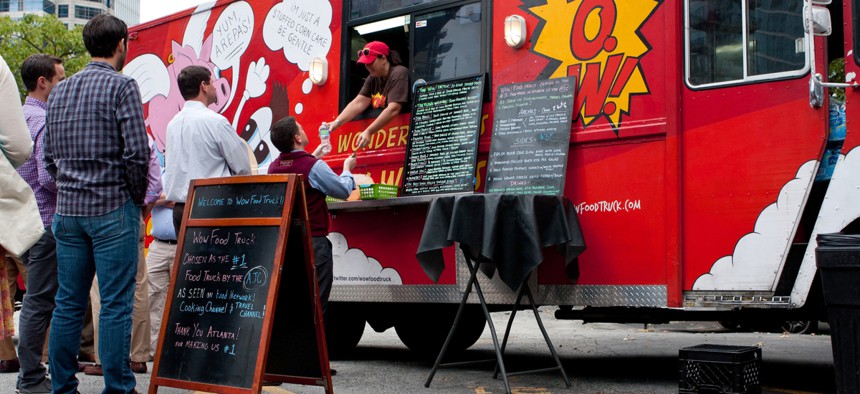New Report Ranks Cities on Their Local Food-Truck Regulatory Regimes

A food truck in Atlanta Shutterstock
A timely Chamber of Commerce index looks at city hall rules from an entrepreneurial perspective.
Food-truck businesses continue to boom across the country and regulatory systems have struggled to keep pace. In just the last decade, the food-truck sector went from sleepy construction-site vending to a $2.7 billion mainstream foodie phenomenon, leaving industry entrepreneurs complaining about a maze of regulations that seem designed to punish the tightly focused vision and operational mobility that is the essence of the business.
The U.S. Chamber of Commerce Foundation has taken up the cause. Authors Michael Hendrix, director of state and local policy at the Manhattan Institute, and Lawrence Bowdish, director of research at U.S. Chamber of Commerce Foundation, aim to help regulators move to the next level with “Food Truck Nation,” a report brought out this past week that includes an index of the rules governing food truck businesses in 20 American cities and a survey of 288 food truck owners.
Mainly, the entrepreneurs surveyed by the Chamber said they felt they had little input in the rulemaking process and described a patchwork approach to regulation that was difficult to navigate and to accept. They argued, for example, that long-established restaurant permitting and licensing rules as applied to their businesses seemed partly irrelevant and partly overkill and that licensing and fees that repeat across jurisdictions add up fast and inhibit movement.
The report’s top-ranked cities—Portland, Oregon; Denver, Colorado; and Orlando, Florida—won praise for the simplicity of their rules, low-operational restrictions and the support services provided.
“Numerous parking lots are set aside across downtown Portland for the exclusive use of food trucks,” according to the report. “And the local government goes out of its way to offer an easily navigable experience for staying in business.”
The report’s lowest-ranked cities—San Francisco, Washington, D.C., and Boston—earned criticism for complexity, restriction and cost.
“San Francisco requires some 32 separate procedures to obtain permits and licenses at a minimum cost of $3,481 before even driving off the lot,” the report reads. “Each permit is valid for one location, meaning that to use the wheels on a truck to move to another vending spot requires going through the same approval process again. Moreover, truck owners must notify competing businesses within a specified radius that they intend to set up shop and receive those businesses’ written authorization.”
Of course, the priorities of the Chamber of Business Foundation and the food truck entrepreneurs it surveyed don’t run exactly parallel to those of government regulators and inspectors. The report doesn’t include city-by-city statistics on health and safety violations, for example, or of illness and safety incidents linked to food-truck businesses.
Still, a quick scan of recent headlines suggests the time is right for more comprehensive data on what approaches seem to be working better than others.
- Utah lawmakers are considering taking a statewide approach to food-truck regulation with an eye toward evening-out licensing fees and requirements across jurisdictions.
- In Chicago, a high-profile food-truck regulation case may be headed to the Illinois Supreme Court. Of the 10 most-populous cities in the country, Chicago is the only one that prohibits food trucks from parking closer than 200 feet from a restaurant entrance. The rule makes it nearly impossible for food trucks to do business in the bustling downtown North Loop neighborhood.
- In Columbiana, Ohio and Bettendorf, Iowa, local officials are debating how best to regulate the food truck business, what kind of fee structure to set and how to calculate it.
John Tomasic is a journalist who lives in Seattle.
NEXT STORY: The Students Who Weren’t Just Marching for Parkland





